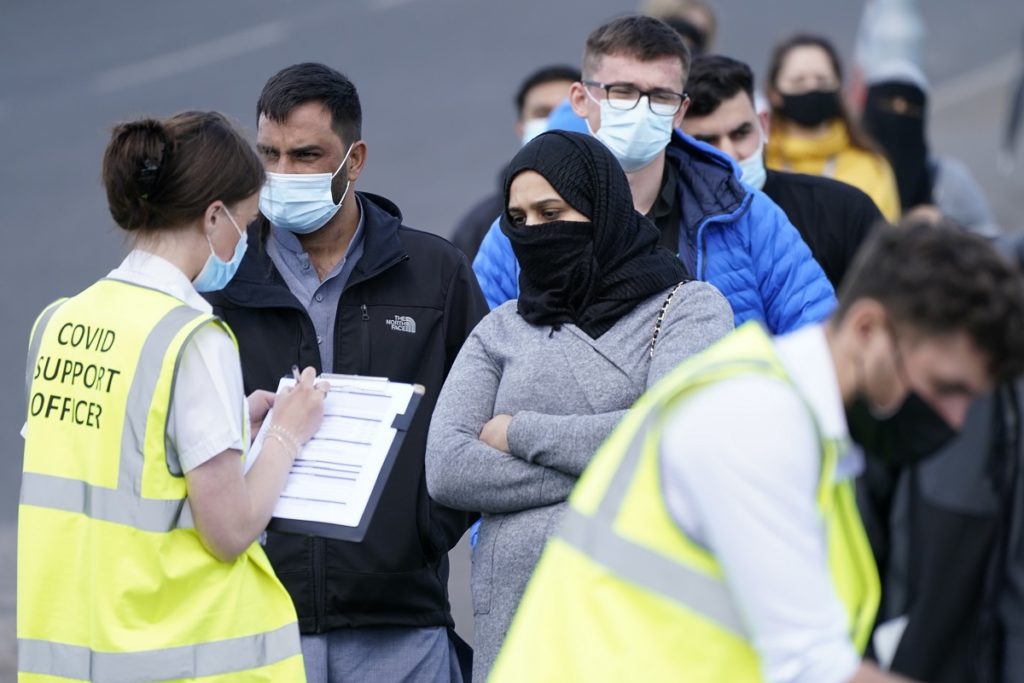It would be more reassuring if they simply accepted their mistakes and pledged not to repeat them. But instead, the government points the finger at someone else: vaccine refusers, irresponsible holidaymakers, those without the common sense to follow clear guidance. And that’s how it outsources the blame for its own failures onto the public.
The Indian variant is a case in point. The government in India warned of the variant on March 24th, but No.10 took until April 19th to put it on the red list, and even then did not act until April 23rd, allowing thousands more people into the UK. If the variant does prove to be much more transmissible, the ensuing spike in infections could cause another covid wave.
A tiny percentage of people with the vaccine will get sick and so will a tiny percentage of those younger, less vulnerable people without the vaccine. But if the overall number of infections becomes large enough due to increased transmissibility and the easing of lockdown, those tiny percentages translate into substantial numbers of people.
We absolutely don’t know that this will happen. Some of the recent data is much more encouraging. But we did know that it could happen. And yet the government failed to take the action needed to prevent the Indian variant getting in.


This was because Boris Johnson was pursuing a post-Brexit trade deal with Narenda Modi, the Hindu nationalist leader of India, whose own mismanagement of the pandemic has led to the most catastrophic covid wave on the face of the Earth. The prime minister’s desperation for post-Brexit trade successes put the health of the British public in Modi’s hands.
But instead of accepting the blame for its behaviour, or showing a trace element of understanding for what it had done wrong, the government blamed vaccine hesitancy. This was lapped up by the press. Health secretary Matt Hancock said those being hospitalised by the variant were “largely people who are eligible for the vaccine but have not taken it”. Journalists asked why “should easing of the lockdown be disrupted to protect people who refuse to take the vaccine?”
On and on it went. Radio news bulletins fixated on vaccine hesitancy. In the Telegraph, Philip Johnston toyed with forcing people to take the vaccine. He accused ministers of shying away from “stigmatising those who are refusing, possibly because many of them are in ethnic minority communities”. The great civil-liberties defenders who lost their minds over lockdowns were suddenly demanding the state force itself into the arm of an unwilling patient.
In reality, there are tiny levels of vaccine hesitancy in this country – some of the lowest in the world. It should be a source of pride, instead of contorted government justifications. Where vaccine hesitancy does exist, the evidence shows that it is best tackled by recruiting local community leaders, answering people’s often-legitimate concerns and taking vaccine programmes into the community, rather than coercion. And many of those programmes are being undertaken, but only under a communications cloak which seeks to transfer the responsibility for the India variant from the government to members of the public.
The same process is bubbling away in the absolute shambles of the government’s traffic light system for travel. No.10 has contrived to develop a system which resists any semblance of logic.
From Monday it became legal to travel to ‘amber’ countries like France and Spain, but Hancock told people not to go to them. But if people shouldn’t go, why weren’t they ‘red’ countries? Why were hundreds of flights carrying passengers to them?
Certainly ministers had no idea. Environment secretary George Eustice said people could travel to them to see family and friends. Welsh secretary Simon Hart said amber countries were for essential travel but that “some people might think a holiday is essential”. Health minister James Bethell said “travelling is not for this year.”
None of these statements were the government line. Some were slapped down. But what was the government line? No-one could tell because the traffic light system plainly made no epidemiological sense. It could not withstand the most modest of rational inquisitions.
And underneath all that was the shocking farce of continuing flights from red list countries like India. There’ve been 110 since the country was put on the red list. Weeks ago, the all-party parliamentary group on covid warned that allowing foreign travel meant travellers from green list countries would spend hours queuing in packed arrival halls with those from red list countries. The warning wasn’t heeded. Nothing was done about it. And that is precisely what transpired.
But instead of acknowledging the mistake, the government’s new response this morning is to implicitly blame the public. Priti Patel emerged today to warn that police would be carrying out home visits to check that people were isolating at home after a trip.
Yet it’s not the public who are to blame. They cannot follow rules which are impossible to articulate, or justify, let alone implement. The fault for what is happening lies with an administration which allowed optimism over the vaccine roll-out to overrule its sense of responsibility.
They need to sort out their approach quickly. And blaming others for the problems they have created only slows that process down.
Ian Dunt is editor-at-large for Politics.co.uk. His new book, How To Be A Liberal, is out now.












